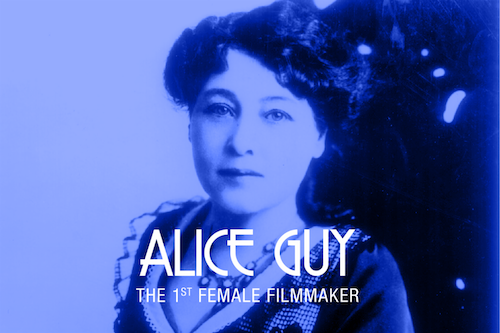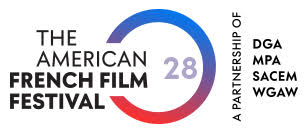ALICE GUY, THE FIRST FEMALE FILMMAKER
(ALICE GUY, L’INCONNUE DU 7EME ART)
Followed by a program of 11 restored short films attributed to Alice Guy
Thursday, October 13 – Renoir Theater – 1:00 pm
(Screening ends at 2:45 pm)
DOCUMENTARY, CLASSIC SERIES
Presented in Association with:
Arte France
Titrafilm
Women in Film
North American Premiere | France | 2022 | Documentary | 52 min | In English
Directed by: Nathalie Masduraud, Valérie Urrea
Written by: Nathalie Masduraud, Valérie Urrea
Illustrator: Catel Muller
Produced by: Victor Robert (10.7 Productions), Arte
Film Editing: Nathalie Amsellem
Cast: Alice Guy, Gustave Eiffel, Léon Gaumont, Gustave Lumière, Louis Lumière
International Sales: Arte France
Original Broadcast: Arte France and Arte Germany, January 2022
Alice Guy‘s inimitable imagination, quick-witted humor, poetic eye, social conscience, and her boundless energy and passion for visual storytelling led her to write and direct almost one thousand films. It all began in 1896, at the tender age of 23, while working as Léon Gaumont’s secretary in Paris, when she literally invented narrative filmmaking, to become its very first director — male or female! Guy eventually followed her husband to New York, where they created Solax Studios in Flushing, becoming the first woman film producer and studio head, and the highest-paid businesswoman in the U.S. at the time. Averaging two two-reelers a week, she was the first director to use stuntmen or to make a film with an all-Black cast. She created the Hollywood star system before Hollywood even existed. Then she was literally — deliberately — erased from cinema history by the very men who unwittingly launched her career. This is her story, in her own words, and inventively told through a plethora of film clips, clever animation and an illuminating filmed interview with Guy herself.
Nathalie Masduraud is a documentary filmmaker whose work has often focused on women artists, like singer Ella Fitzgerald or writer Françoise Sagan. Valérie Urrea‘s documentaries have focused on autism, gender and racial issues, and dance, including several films on the work of choreographer Mathilde Monnier. Both women began making films in the late 1990s, but have more recently joined forces, co-directing Afrique du Sud, portraits chromatiques (2014); Focus Iran, l’audace au premier plan (2017); Pornotropic, Marguerite Duras ou l’illusion coloniale (2020); H24, 24 Heures dans la vie d’une femme (2021). Alice Guy, the First Female Filmmaker is presented at The American French Film Festival with a program of films attributed to Alice Guy, recently restored by Gaumont.

A PROGRAM OF FILMS ATTRIBUTED TO ALICE GUY
This program of eleven whimsical, acerbic, poetic and downright funny films — including the one that started it all: The Cabbage-Patch Fairy (1901), deemed the first narrative film of all time — is not to be missed. It offers a rare peek into the massive film oeuvre attributed to Alice Guy, as well as a glimpse into her inventiveness, wit and point of view. Many of the films focus on the feminist themes of motherhood, pregnancy and gender roles, but also on mechanization, medicine and certainly the burlesque. The program even includes a music video and the very first making of, in which we see Alice herself, in 1906, on a sound stage, directing the opening ballet for Romeo and Juliet. The program includes the following films:
Madame’s Cravings (Madame a des envies) (1906), 4:30 min.
The Cabbage-Patch Fairy (La Fée aux choux) (1901), 1:15 min.
Midwife to the Upper Class (Sage-femme de première classe) (1902), 4:38 min.
On the Barricade (Sur la barricade) (1907), 4:29 min.
Alice Guy Directs a “Phonoscène” (1906), 2:02 min.
Félix Mayol Performs “Indiscreet Questions” (Questions indiscrètes) (1906), 3:21 min.
Automated Hat-Maker and Sausage-Grinder (Chapellerie et charcuterie mécaniques) (1900) – 1:06 min.
The Consequences of Feminism (Les Résultats du féminisme) (1906) – 7:39 min.
Cook and Rilly’s Trained Rooster (Le coq dressé) (1910), 2:32 min.
Turn-of-the-century Surgery (Chirurgie fin de siècle) (1900), 2:17 min.
The Race for the Sausage (La Course à la saucisse) (1907), 4:30 min.

